North America Watch Why can the government only sigh when gun violence is rampant in the United States?
The proliferation of gun violence has become a cliche in the United States. According to the data of the US Centers for Disease Control and Prevention, there were nearly 40,000 people who died at gunpoint in the United States in 2019, of which one-third died of murder and nearly two-thirds died of suicide. In addition, the proliferation of firearms will cause about 115,000 people to be disabled in the United States every year. In contrast, since the US military entered Afghanistan in 2001, the death toll of the US military there is 2,312.
According to the report of American Broadcasting Corporation (ABC), the annual economic loss caused by gun injuries in the United States is about $300 billion, and the GDP of the United States is nearly $21 trillion in 2020. That is to say, the annual economic loss caused by guns is equivalent to 1.3% to 1.5% of the GDP of the United States. Putting this proportion into the huge economic aggregate of the United States, the absolute value is still very amazing: it is equivalent to Americans destroying a Finnish economy every year because of shooting (Finland’s GDP will be 300 billion US dollars in 2020).
It can be said that the severity of gun violence in the United States is unique among developed countries. Therefore, the issue of gun control has become a jargon in the debate of the American Congress. However, despite the fierce quarrels among lawmakers, they often start this endless debate whenever there is a large-scale shooting incident. However, in the past 50 years, there has been no real substantive decision on gun control and solving the problem of gun proliferation.
So, what makes it so difficult for the United States to control guns?
The reason why Americans have the right to hold guns is a bit roundabout.
First of all, we must clarify a concept, that is, the argument that people are free to hold guns in the Second Amendment of the US Constitution, which is emphasized by many gun-holding organizations, looks more like an absurd historical "myth" today.
In 1791, the US Congress passed the Second Amendment, saying that "a well-disciplined militia is necessary for the security of a free country; The people’s right to hold and carry weapons shall not be violated. " The reason for enacting this amendment is that holding guns by citizens will help prevent the expansion of the power of the federal government and prevent the government from imposing tyranny on the people.
It is true that many armed militiamen joined the struggle against British "tyranny" when the North American colonies became independent, but these militiamen with no military organization and no logistical support could not resist the attack of the British regular army for a long time. Even many militiamen joined the war of independence with the mentality of firing a few shots and sneaking home to continue farming if they failed.
The American War of Independence can be won, thanks to the French navy’s unprecedented defeat of the British Royal Navy, which has always been invincible in the 18th century. As a result, the British main force entrenched in Yorktown was cut off, and the commander-in-chief cornwallis was forced to surrender to the French army and the Continental Army led by Washington. The powerful "armed militia" is the "founding myth" of the United States, and it is the regular navy and army that really overturns the British.
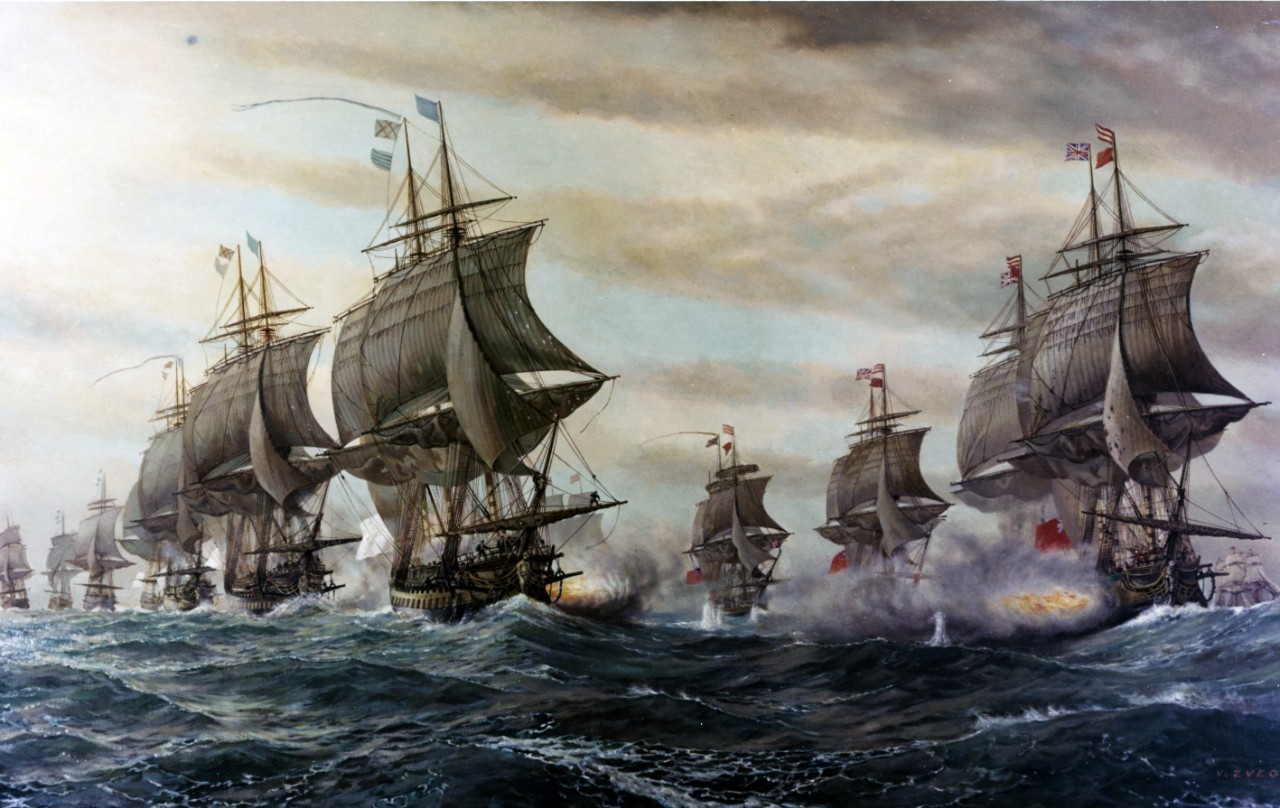
△ In the Chesapeake Bay naval battle, the French fleet successfully prevented the Royal Navy from rushing to help the British main force stationed in Yorktown, thus controlling the sea power in the theater, causing the British army to declare its surrender after running out of ammunition, thus ending the American War of Independence. (Source: US Navy)
Moreover, individuals with guns can never compete with the state machine, and the US federal government does not hesitate to use military power far beyond the firepower of the people’s guns to carry out armed repression. During the American Civil War, a large-scale anti-conscription riot broke out in new york, and the American government responded with artillery. Some even said that warships moored in new york also participated in the suppression of the rioters. Unlike the revolvers commonly used by rioters at that time, the heavy weapons of the army were not available to the people at all, and even if they were held, they could not afford to maintain them.
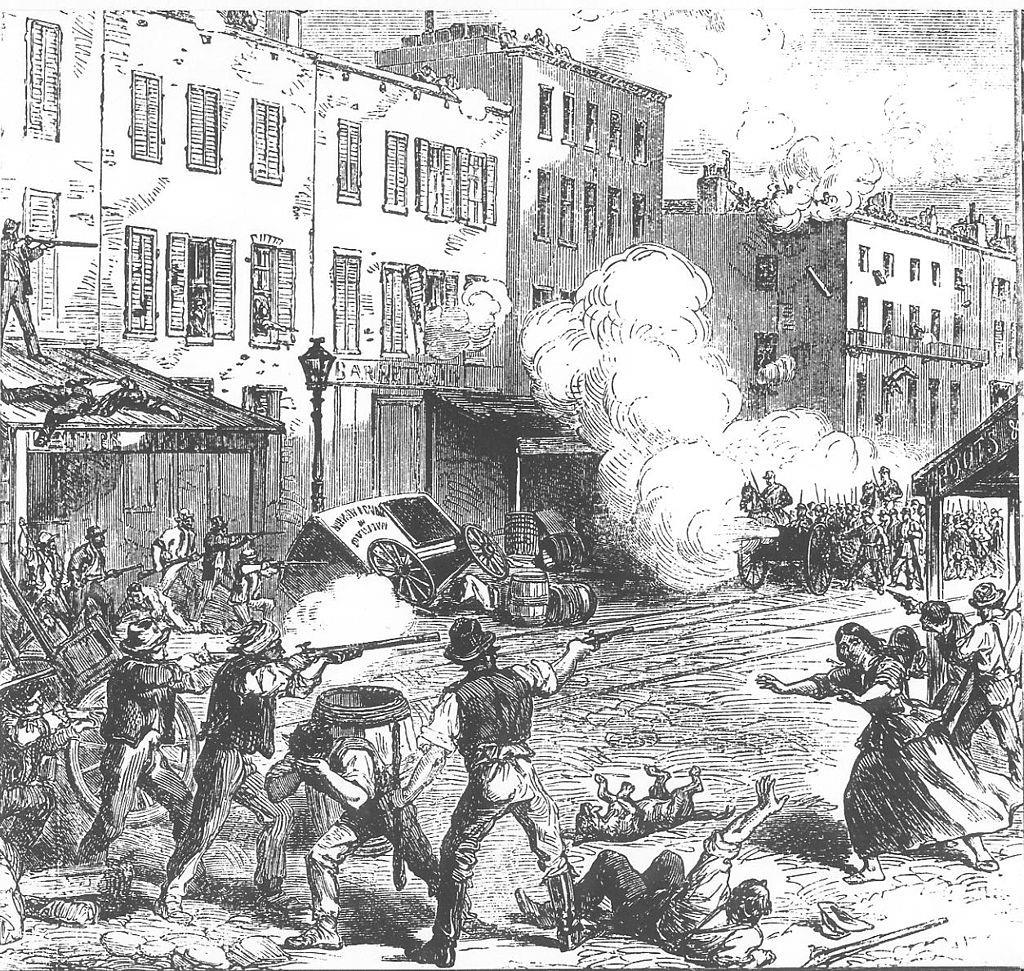
△ In 1863, there was a conscription riot in New York, and the army used artillery to suppress the participants in the riot. (Source: new york Times)
In the 21st century, with the rapid progress of military science and technology, the firepower gap between the army and the people holding guns is even greater. Not only that, since the Bush era, the US military has also transferred surplus military equipment to local police through the so-called "Project 1033", and the US special forces have trained police officers, which has made the American police a veritable paramilitary organization. Under such circumstances, the American people also know that there is no good end to engaging in large-scale armed riots. Therefore, when the new york police made a move, the crowd dispersed.
After this year’s farce of "Occupy Capitol Hill", no one has stood up with guns and opposed the US government’s nationwide night fall.
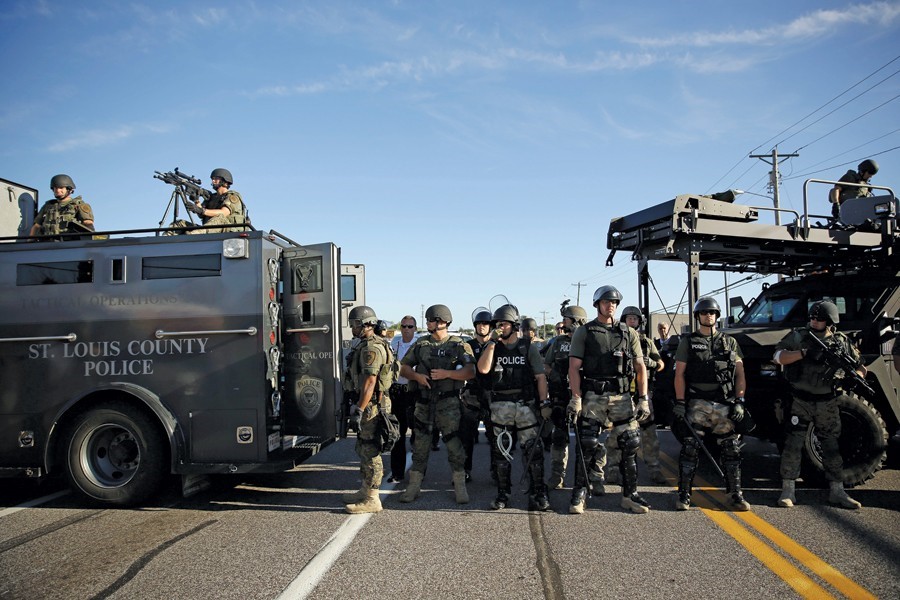
△ The equipment and training of American local police have been militarized, and ordinary gunmen are far from their opponents. (Source: Johns Hopkins University)
The biggest beneficiary of people holding guns is the southern slave owners.
In fact, I’m afraid that the reason why the Second Amendment to the US Constitution was passed that year was not that members of Congress really believed that people holding guns was conducive to resisting the government’s "tyranny".
At that time, it was not long after the Shays Uprising (1786-1787) against the Massachusetts authorities, and the argument that people could not be trusted was still popular among the political elites in the United States at that time. In fact, the biggest beneficiary of allowing people to hold guns is the slave owners in the south.
When the United States was founded, slave farming was the most obvious private industry that relied on guns. In order to prevent slaves from rioting and fleeing, unofficial "slave patrol" system appeared in southern States, which is also one of the origins of American police system. According to the logic of slave owners, these slave patrols are also "well-disciplined militia" mentioned in the Second Amendment to the Constitution. The existence of slavery also explains why the amendment emphasizes that "well-disciplined militia" is crucial to national security, because only whites could join the militia at that time. Emphasizing that "militia" owns guns, not individuals, can exclude blacks from the ranks of gun owners and realize the absolute superiority of whites over blacks in force. At that time, the slave uprising in the French colony of Haiti was in full swing, and black slaves slaughtered a large number of white slave owners, which seriously stimulated American slave owners.
It can be said that it is an inevitable interest proposition of these people to emphasize the gun support right of white militia.
The Paradox between Gun Control and Law
At this point, we can see that the Second Amendment to the American Constitution is out of touch with the development of the times, and the basis of legislation at that time seems to be contrary to the basic moral standards of mankind today. This amendment is also the most fundamental legal reason for the inability to control guns in the United States today.
However, as a basic law, the American Constitution can hardly be amended again. According to the current law, amending the Constitution requires at least two-thirds of the members of the Senate and the House of Representatives, respectively. However, in the Congress where politics and lobbying prevailed in Jin and Yuan Dynasties, lobbying organizations, represented by the National Rifle Association of the United States and reflecting the interests of various arms dealers, have long held key members firmly in their own hands. Not to mention amending the constitution, any attempt to tighten gun control at the state and federal levels will be strongly and effectively stopped by the Rifle Association.
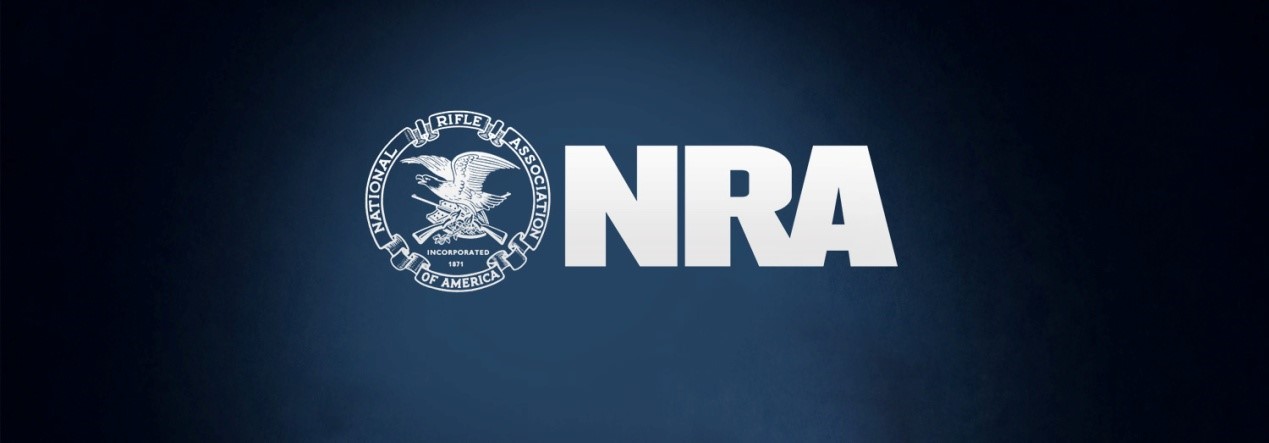
△ The National Rifle Association (NRA) is one of the most important political lobbying groups in the United States. (Source: NRA official website)
Not only Congress, but also the judiciary has played a very disgraceful role in the problem of gun proliferation in the United States.
Compared with long-barreled firearms, pistols are more secretive, which is beneficial for gunmen to engage in large-scale shooting by surprise, and is also very suitable for suicide. Therefore, the city government of Washington, the capital of the United States, once attempted to completely ban the possession of pistols. However, in 2008, the United States Supreme Court ruled that the actions of the Washington municipal government were unconstitutional, and at the same time reinterpreted the Second Amendment, confirming that the right to own guns was not limited to militia, but included all individuals. Since the ruling of the Federal Supreme Court is final, it means that gun control efforts in many states have been wasted.
The game of gun control and gun prohibition
Of course, the justices of the Federal Supreme Court did not forget to show their "neutrality" in their judgments, claiming that guns and gun rights still need to be managed by someone. Nice words, but how to "manage" guns is a mess that puzzles American politicians.
Due to the federal nature of the United States, the responsibility for formulating specific gun management policies is shared by the federal government and local governments. The federal government is responsible for issuing gun sales licenses and conducting background checks on gun buyers to confirm that they have no criminal record before they can legally hold guns. Local governments are responsible for formulating specific provisions for carrying guns in public places. It seems that governments at all levels have a clear division of labor, but there are many loopholes in actual operation.
First of all, not everyone needs a federal license to sell guns. If they are selling guns in their own homes, online or at gun exhibitions, they do not need a federal license to sell guns for long-term profit. Because enterprises and individuals with sales licenses have the responsibility to inform the federal government of the identity of gun buyers so that they can conduct background checks, this means that when sellers without licenses sell guns, the federal government cannot investigate the identity of buyers. According to a study conducted by Harvard University in 2017, one-fifth of the gun transactions in the United States have not undergone background checks.
Second, since gun ownership has become a "natural human right", only a few states require residents to apply for a gun license. Therefore, most of the time, the government passively screens the legitimate owners when the gun trade takes place. Except for those States that need to have a license to buy guns, local governments can’t actively screen gun owners or train gun owners in the code of conduct.
Third, even if a comprehensive background check system is implemented nationwide, as many gun control groups now support, to plug the loopholes that guns can’t be investigated during gun exhibitions or online purchases, or to implement a nationwide gun purchase license system, it can’t solve a core problem, that is, because guns in the United States have been flooding for a long time, a large number of criminals illegally buy guns through the black market instead of through formal channels. This means that no matter how many gun control policies are formulated by the government, as long as the United States can’t implement a strict national ban on guns, people who want to own guns always have ways to deal with it. All gun control policies instead of banning guns are aimed at preventing gentlemen and not villains.
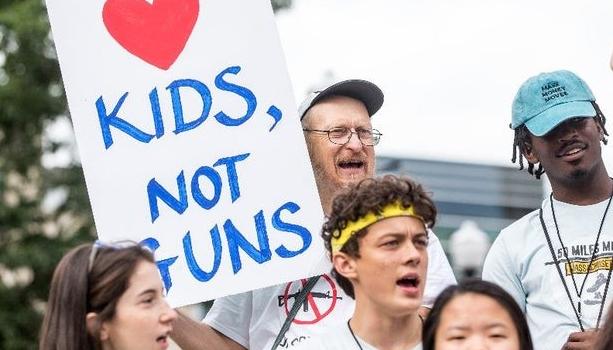
△ American people who participated in the national demonstration on gun violence day. (Source: Capitol Hill)
Why is there no solution to the rampant gun violence?
The problem of gun proliferation in the United States is a typical institutional case. The revision of the Constitution, the legislation of Congress, the interpretation of the law by the courts, the separation of powers between the central and local governments, lobbying and the intervention of interest organizations, almost all kinds of gloomy aspects in American politics are reflected in the gun issue. To solve the problem of gun violence in the United States, I’m afraid what we need is not to tinker with a certain law, but to thoroughly reform the system of representative federalism with three powers, which is full of ills. But this is completely impossible to achieve in the United States today, so we can only let it go.
Now, Americans are completely numb to large-scale gun incidents. Since the beginning of this year, there have been nearly 250 large-scale shooting incidents that have caused more than three casualties. Gun control, like other stubborn diseases that cannot be solved because of the American system, has become a tool used by politicians to attack each other. The more quarrelling, the less means to solve it properly, and the gun violence will continue. After all, members of parliament live in wealthy areas with good public security, and the shooting of people is still far away from them. (Contributed by Jing Zhao)